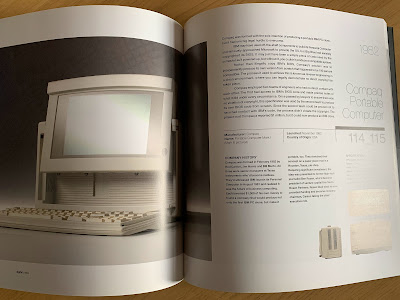There are times when you pick up a book and you know it's a keeper, even before you realise you're going to build up a library on a particular subject. Chandler's The Campaigns of Napoleon is one, Massie's sublime Dreadnought (and it's worthy follow up, Castles of Steel) are two more. For computing, it has to be this coffee table wonder: Digital Retro.
Written by former editor of Personal Computer World (RIP, you marvellous beauty of a magazine!) Gordon Laing, this is a book focusing on (mostly) affordable hardware that defined computing between 1975 and 1989 in the UK. With 192 pages, 400 pictures and in full colour, Digital Retro was one of the first retro-inspired books I ever saw in the wild back when it was published in 2004.
There is a short introduction and a brief history of computers before it kicks off with the first entry proper: the MITS Altair 8800. This establishes the formula for each machine. There's a large format photograph, background to the machine's creation, a company background, side areas for technical specifications, and a run down of name, manufacturer, year of release and country of origin. There are also sections on what happened next (and in some cases, these are tales of tragedy - looking at you, Osborne 1), as well as a "did you know" and many, many photographs of the kit from various angles.
 |
| As far as wish lists go, it's a doozy! |
Indeed, as every device gets four pages, it's the photography that gives this tome its true value. Oh, the text is well written and informative, but this is a book you look at first, and then read. And it's not just about computers, as games consoles such as the Coleco Vision, Nintendo Famicom/NES and the Sega Master System get a look in too. Each machine looks glorious and tugs at the part of my brain that says "you need to own one of these!" Then sense arrives and I don't even bother looking at modern day prices. But, by God, don't some of these machines look fantastic!
 |
| The Compaq Portable III. Hubba hubba!. |
The last entry is the NeXT Cube, and whilst it's great to see the likes of the Amstrad PCW and Acorn's Archimedes included along the way, there is the hint that a couple more systems could have been included. There again, the intro does state that coverage is aimed at mostly affordable home computers, with key business machines and games machines included where they have "influenced future standards", so these are the ones that made their mark (however lightly) on the market. And yes, some of the entries here tread very lightly in the UK - the Mattel Aquarius, Apple Lisa and Jupiter Ace were certainly available, but they failed to take off for a variety of reasons.
 |
| This was not the dawning of the Age of Aquarius. |
Finally, there is a post-history section, four pages taking us from 1989 to the then-present day. It all feels rather quaint, but then when it comes to technology, it often does. However, the author isn't wrong when focusing on three core technologies: broadband, wireless connectivity and seamless interaction without technical intervention - and it took a while, but the modern day smartphone epitomises those three technologies perfectly.
 |
| What style! What grace! What poise! |
Digital Retro is a glorious celebration of retro computing and a tremendous volume that acts as a love letter to the many (mostly incompatible) machines that the average 1980's buyer might have seen. It's a book I will never get rid of. Sadly, it is no longer in print and copies of Amazon are, to put it mildly, in the "collector's realm" of pricing. Or, as we say locally, "You want how much? Haddaway and shite, man!" If you can find a copy that doesn't cost the earth, grab it, and revel in peak 1970's and 80's computing. They just don't make them like they used to.


No comments:
Post a Comment